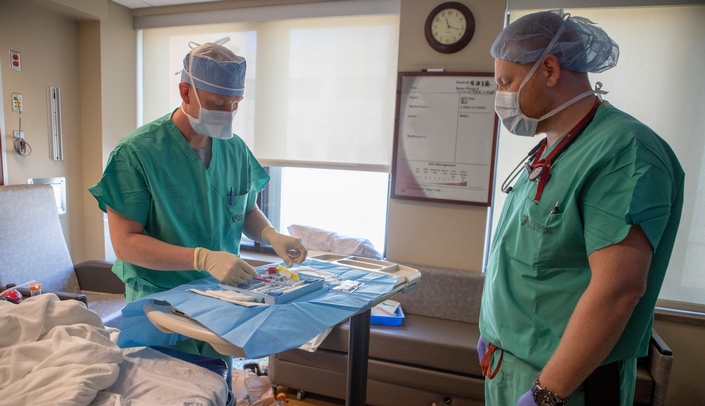Editor's Note: To celebrate the American Society of Anesthesiologist's Physician Anesthesiologist Week, January 26 – February 1, we will examine the recent leadership of our physicians to shape patient care, education and research in our institution.
The 2018-2019 academic year brought growth and changes in the obstetric anesthesiology division with the departure of the inaugural division chief and the approval of an ACGME-accredited obstetric anesthesiology fellowship program.
Cathleen Peterson-Layne, MD, PhD, joined the department in December 2016 as the department’s first official division chief of obstetric anesthesiology. Dr. Peterson-Layne and division members spent the next two years collaborating with obstetricians, midwives and the nurses on labor and delivery to enhance care on the unit by implementing processes to mitigate risk using skills of anesthesiologists. Dr. Peterson-Layne became vice chair of education at Emory University in Atlanta in May 2019. Charles Walcutt, M.D., assumed the position of interim chief of obstetric anesthesiology.
"The education I gained and leadership I experienced at UNMC is the reason I have the opportunity to go to another level," said Dr. Peterson-Layne. "The division is well-positioned to provide excellent, evidence-based anesthetic care while providing excellent training to future clinicians."
In academic year 2018-2019, department leaders established the first-ever UNMC obstetric anesthesiology fellowship. Program structuring and candidate recruiting is currently underway. With the addition of this fellowship, as well as the regional anesthesiology and acute pain fellowship, the department now offers fellowships in all six ACGME-accredited subspecialties.
The division continued to implement and enhance practices to prepare for high-risk scenarios, such as hemorrhage and pre-eclampsia. Introducing patients to multi-modal analgesia regimens aimed at decreasing the amount of opioids given following cesarean delivery remained a priority. Residents and staff contributed to the education of the obstetric team at morning report, as well as occasional lunch and learn sessions.
Preparation of clinicians to implement rapid and effective obstetric care was a priority. Amanda Arnzen, MD, worked with obstetricians to establish a system for evaluation of patients with high-risk pregnancies prior to arrival for delivery. Additionally, Dr. Arnzen led the effort to establish a collaborative relationship between obstetricians and the department’s critical care division with the goal of optimizing transitions of care. Dr. Arnzen was also appointed to the Society for Obstetric Anesthesiology and Perinatology (SOAP) ad hoc committee on critical care.
Several residents presented case reports the SOAP and the American Society of Anesthesiologists (ASA) annual meetings. In December 2018, Dr. Peterson-Layne led an international webinar organized by the Foundation for Women and Girls with Bleeding Disorders on the topic of preparation and management of obstetric hemorrhage. John Ohnoutka, MD, developed a problem-based learning discussion titled "Cystic Fibrosis in the Pregnant Patient" that is available on OpenAnesthesia for use to educate residents and fellows.
